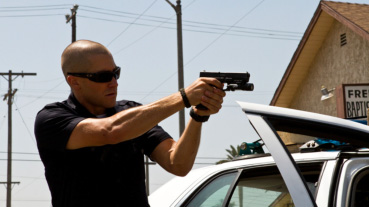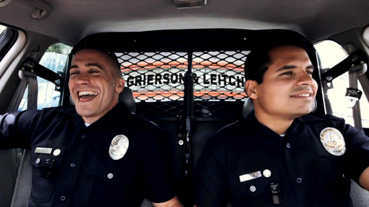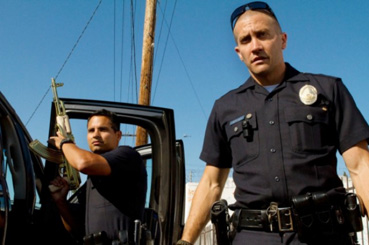|
"Once upon a time in South Central" reads the title card introducing yet another tale of depraved cops and criminals caught in the crossfire of LA's mean streets.
Once upon a time, this wrong arm of the law conflagration of excessive bullets, bad mouthing and bombast might have shocked, awed, and left jaws on the floor, but not ten years after Training Day and an Oscar nomination which ensured writer-turned-director David Hayer would never stray from his semi-autobiographical hardboiled comfort zone. These gritty crime actioners told from the seedier side of the street deal clichés like drugs, and the number of boiler plate scenarios are as frequent as shots fired.
Following the title card's misleading promise of a modern day Western which isn't even remotely suggested elsewhere, bull headed aspiring detective Brian Taylor (Jake Gyllenhaal) tells us (in an imploringly stern voiceover straight out of an LAPD recruitment campaign), that he lives by the law and is unable to walk away from it, even when he disagrees with it. If this is supposed to be a stirring sermon to the boys in blue, it's at best a vaguely inspirational identifier severely at odds with his adolescent methods of dispensing justice.

End of Watch is another Ayer project anchored by stunt casting. Denzel Washington's "King Kong ain't got shit on me" routine may have turned a devil's advocate drama into out and out comedy at the expense of Oscar emoting, but nevertheless, it remains a convincing hundred and eighty degree turn from all the none more righteous, 'wronged man out for justice' roles that previously defined Washington's screen persona. The same tactic doesn't work nearly as well when we're asked to re-imagine one time indie kid turned beardy Men's Fitness model, Jake Gyllenhaal as the most gung-ho badge on the block. Shaving his head and giving him a foul mouth is not enough to cut it, and it's obvious from the start that his is one of a number of squeaky clean faces currently populating Hollywood that were never meant to be dirtied. Gyllenhaal lacks both the trigger-happy danger of his contemporary Ben Forster or the towering authority of former rogue cops Woody Harrelson (Rampart) and the aforementioned Washington. He's partnered with wisecracking Michael Pena as a pair of daredevil enforcers busting criminals and each other's balls while out on patrol in some of LA's deadliest neighbourhoods.
The two leads have great chain-yanking chemistry but most of what comes out of their mouths offends, particularly when you have to listen to Pena's juvenile horndog, Mike Zavala figuring his wife for a good woman simply 'cause she's able to put up with his shit, or Gyllenhaal's jock moan about how easy it is for him to get women into bed and all but impossible for him to make them stay there. Y'see, all he wants is the love of a good woman, but I doubt he's ever met one, never mind slept with one. Clearly confusing physical intimacy for emotional intimacy (in which both he and his partner seem desperately deficient), any mushy outpourings are reserved exclusively for each other, with reciprocated volleys of "Bro!", "Dude!", "BRO!", "DUDE!" making up most of their monosyllabic banter. In fact, I'd go so far as to wager that the brain cell destroying repetition of these two words accounts for at least fifty percent of the screenplay. If End of Watch is the 5-O's very own gung-ho promo that hopes to encourage impressionable idiots the same way Top Gun had them signing up to the air force in the eighties, then Tony Scott's film has never sounded smarter. Most of the time, End of Watch is remarkably like watching Beavis and Butthead in uniform.
With or without their uniforms they're a pair of kid cowboys alarmingly waving daddy's gun around, and hearing gales of laughter from should-know-better critics apparently charmed by their machismo, frat boy gun-tooting made the experience all the more depressing.
Save for a genuinely amusing moment in which the white guy mimes Mexican family clamour and the Mexican retaliates with latte-sipping white guy boredom, many of the buddy cop brain dead attempts at humour come from the vindictive and disgusting manner with which they cuff crims.

Ayer's a filmmaker who commendably strives for street verisimilitude, yet his half-arsed, incorporation of found footage from button cameras distracts and disturbs. Brian, capturing his partner's knockdown drag out with a perp on camera whilst yelling encouragement like a spectator at a boxing match rather than stepping in to offer assistance, shows him to be nothing more than a playground bully with a warrant. Even when Zavala's getting his ass kicked, Brian laughs gleefully throughout the entire incident, as did many of the audience members at the press screening I attended – a reaction as disheartening as the violence on screen.
Directorially, Ayer's intentions with a scene like this aren't about questioning such mockeries of justice, so much as celebrating them (high fives and all), in what you can only hope was an atrociously miscalculated attempt to bring some levity to the faux vérité grit of his thrice-used gangland setting. Without realizing it – or simply not wanting to tackle the subject – by implication, the very nature of such footage purporting to show what really goes down while cops work their beat, accusatorily questions the unprovoked methods of the entire Los Angeles police department. Unfortunately, this far more provocative line of enquiry is left hanging.
"Do you feel like a hero?" Zavala asks after his partner gets recognition of exemplary service, to which Taylor can only respond, "What's a hero feel like?" Even a comic book fascist-leaning sci-fi fantasy like Dredd possesses a twang of average Joe moral conduct, whereas these power drunk hooligans are eagerly awaiting an excuse from dispatch to fire off their guns.
Recording vicious assaults for an audience that's never specified, it wouldn't surprise me if the blu-ray's deleted scenes included the moment where Brian rushes home to upload the caught-on-camera brawls to YouTube. There's something about a community college class in filmmaking while he also studies law, but the smirk he's wearing when he says this is hard to take seriously. Truancy probably led this guy to joining the force in the first place, and his arrogant inability to take anything seriously makes Brian a highly improbable fit as the guy earnestly tying to improve his lot in life by swatting up on night classes, despite repeated assurances from his partner that "you're, like, totally smart, dude!"
Without a satisfactory reason for why Brian is amassing all this material in the first place, or why his superiors leniently allow him to go on filming despite complaints from other officers, Ayer's entire visual framework feels phoney, taking the viewer out of the intended reality rather than enhancing it.
The unctuous married couple bickering of two lugheads in love with one another is hard to laugh with or warm to, especially when it relegates other names of interest to glorified walk-ons. Anna Kendrick is the 'all American' Stepford girlfriend with a robotic smile of gleaming pearlies who captures Taylor's heart for being able to string two sentences together and uninhibitedly singing along to bad rap music in the car. America Ferrera barely registers and Frank Grillo, a longtime face of TV, just now starting to make a name for himself and so good in both Warrior and The Grey, is utterly wasted here as the police captain. Only Magic Mike's breakout star Cody Horn manages to impress, again playing one of the boys as a shit-kicking no nonsense fellow officer, and boy does she look good in uniform.
When the film's smack-talking sparing contest between the two leads falls short, the film's biggest (unintentional) laugh comes during the climatic shoot out, in which a gang leader and five of his cronies spray assault rifles directly at Taylor from an elevated position at point blank range – who of course escapes without a scratch. As with all his previous work, Ayer desperately wants to create a sense of mortal danger around every street corner, so you can't have that kind of cartoony approach to action when you're ostensibly presenting a real life, cop's-eye view from the gutter. Though I suppose an argument for realism could be made, being that the gangstas spend more time running their mouths than they do at the target range, and still haven't caught on that holding a gun sideways does nothing to improve your marksmanship.

While I might be able to forgive the appalled, play-it-by-the-book senior officer who begrudgingly comes to respect the by-whatever-means manliness of these two renegade hot heads, the revolving door of homeboys, gangbangers, dawgs, hopheads and putas our boys come up against presents a cornucopia of sneeringly profane stereotypes, possibly even more played out than the found footage trend.
Even the gang initiation of rival killing has now become a laughable cliché. It's no longer a shocking destination or inherently dramatic, 'cause no matter how many F-bombs you drop, we've already seen every possible permutation of how these scenes play out on screen. I'm certain that Ayer would insist he's only painting life as he knows it to be, but more than enough films have already done this to the point where his adding to the pile can only feel parodic.
And yet, Ayer continues to trot out the same tired series of ghetto exploits you've seen in every other turf war film ever made. There's a scene of shoehorned topicality, discussing the paradigm shift of street ethnography and how when the blacks used to rule, there were chicken stands on every corner, but now that the Mexicans are in charge, taco stands have taken their place. Well boo hoo for those unfairly usurped. Chicken stands or taco stands, it's hard not to feel anything but contempt for the lot of them. Doing us all a favour by wiping each other out would be the ending this film and its entire sub genre deserves, the continued representation of these demeaning stereotypes a sort of inverse racism toward both cultures.
When you break it down, End of Watch is a series of increasingly nasty skirmishes culminating in POV shaky cam blast-o-rama and nothing more. The filmmakers know it too. As a big fan of composer David Sardy (Zombieland, 21), it pains me to say that his totally inappropriate music is all over the map here, evidenced in an over-scored downer of an ending backfiring in its attempt to trick you into thinking that the film carries any weight whatsoever after all the inane prattle and chest-thumping Alpha Beta Sigma macho bullshit that preceded it.
End of Watch plays the 56th BFI London Film Festival at the Odeon West End on Thu 11th October at 18:30 and Sat 13th October at 12:15. Tickets can be purchased here.
|